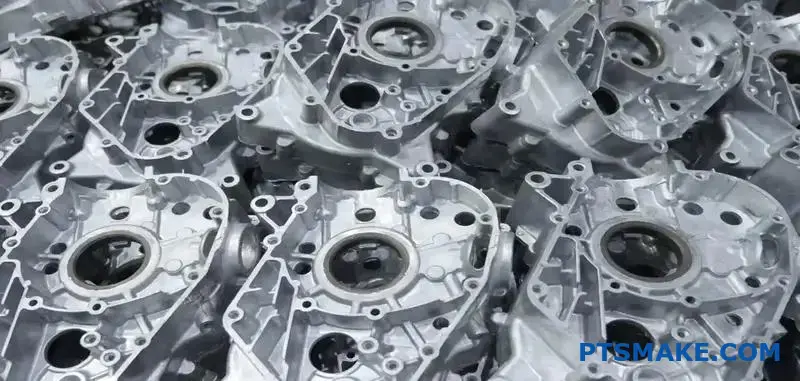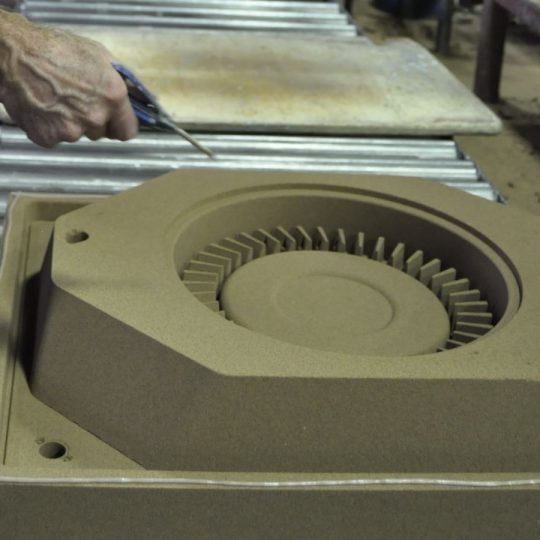Understanding the Mechanics Behind Aluminum Foundry
Discover the Advantages of Aluminum Casting in Modern Manufacturing
Aluminum casting has actually arised as an essential procedure in contemporary manufacturing. Its light-weight yet robust nature provides significant advantages for different sectors. The ability to accomplish complex layouts and maintain limited tolerances includes in its charm. aluminum casting. Furthermore, the cost-effectiveness and ecological advantages make it a lasting selection. As manufacturers seek ingenious options, the duty of aluminum casting remains to evolve. What particular applications and benefits await exploration in this dynamic area?
Solid yet light-weight: The Benefits of Aluminum
Numerous products are utilized in production, aluminum stands out due to its amazing combination of lightweight residential or commercial properties and remarkable strength. This one-of-a-kind feature makes aluminum an excellent option for various applications, specifically in markets such as automobile, aerospace, and construction. Its reduced density enables simpler handling and transport, adding to minimized energy usage during manufacturing and assembly procedures.
Furthermore, aluminum's strength-to-weight proportion goes over, enabling makers to create durable parts without adding unnecessary mass. This particular is particularly beneficial in industries where weight decrease can bring about improved gas effectiveness and general performance. In addition, aluminum's resistance to deterioration enhances the long life of products, even more strengthening its appeal in contemporary production.
Ultimately, the lightweight yet strong nature of aluminum placements it as a preferred material, promoting innovation and efficiency throughout numerous sectors. Makers significantly identify that these benefits can result in considerable innovations in design and functionality.
Precision and Intricacy in Layout
As producers welcome the capabilities of aluminum casting, they find brand-new methods for precision and complexity in style. This manufacturing process permits for the creation of elaborate shapes and thorough attributes that conventional techniques usually struggle to accomplish. The fluidness of liquified aluminum allows it to load complex molds, leading to elements with limited resistances and great surface area coatings.
This precision is specifically advantageous in industries such as aerospace and vehicle, where specific requirements are essential for performance and safety. Aluminum casting also accommodates innovative designs that enhance functionality without compromising structural stability.

Cost-Effectiveness and Efficiency
Cost-effectiveness and efficiency are extremely important considerations for makers discovering aluminum casting as a production technique. Aluminum casting deals significant expense benefits as a result of its reduced material costs compared to various other steels (aluminum casting). The light-weight nature of aluminum reduces shipping and handling costs, and its excellent thermal conductivity permits quicker cooling times during the casting procedure, boosting overall manufacturing rate
Furthermore, aluminum's convenience enables producers to create complicated forms and layouts, decreasing the need for extra machining or assembly. This streamlining of manufacturing not just reduces labor expenses but also reduces preparations, enabling companies to react promptly to market demands.
The sturdiness and corrosion resistance of aluminum castings add to longer item life expectancies, decreasing substitute expenses over time. As an outcome, producers can achieve an equilibrium of premium result and lowered functional costs, making aluminum casting a significantly eye-catching choice in contemporary manufacturing.
Ecological Sustainability of Aluminum Casting
Aluminum casting attracts attention as an eco lasting manufacturing alternative, especially due to its recyclability and reduced eco-friendly impact. The process enables the reliable usage of aluminum, a material that can be reused forever without losing its buildings. This particular considerably decreases the need for virgin aluminum, thus decreasing and saving natural sources energy intake connected with removal and handling.

Applications Throughout Industries: From Automotive to Aerospace
While diverse industries remain to look for innovative materials for manufacturing, aluminum casting has proven to be a versatile remedy throughout industries such as automotive and aerospace. In the auto sector, aluminum castings add to light-weight vehicle layouts, improving fuel effectiveness and performance. Components like engine blocks, transmission real estates, and wheels gain from aluminum's strength-to-weight proportion.
In aerospace, aluminum casting plays a substantial role in producing complex components that call for high toughness and low weight. Aircraft components such as braces, touchdown gear, and structural structures make use of aluminum for peak performance and security.
In addition, the adaptability of aluminum casting permits it to provide to various other additional hints industries, including customer electronics, aquatic, and commercial machinery. This flexibility not only satisfies the details demands of different applications yet also supports continuous innovation in manufacturing processes. Therefore, aluminum casting continues to be a principal in modern production throughout numerous markets.
Frequently Asked Questions
How Does Aluminum Casting Contrast to Other Metal Casting Procedures?
Aluminum casting offers remarkable strength-to-weight ratios, faster air conditioning prices, and exceptional deterioration resistance compared to various other metal casting procedures. These benefits make it suitable for various applications, improving efficiency and performance in production.
What Are the Typical Lead Times for Aluminum Casting Projects?
Typical lead times for aluminum casting tasks range from 2 to eight weeks, relying on factors such as intricacy, order dimension, and production ability. Efficient planning can aid minimize delays and boost task timelines.
Can Aluminum Casting Be Used for Intricate Styles?
Aluminum casting can without a doubt accommodate complex layouts. Aluminum Casting Company. Its fluidness enables comprehensive patterns and shapes, making it appropriate for complicated parts in numerous industries. This adaptability boosts layout liberty while maintaining structural stability and performance
What Post-Processing Options Are Offered After Aluminum Casting?
Post-processing choices for aluminum casting consist of machining, brightening, surface area treatments, anodizing, and welding. These techniques enhance the coating, enhance dimensional accuracy, and rise corrosion resistance, therefore maximizing the end product's performance and visual appeal.
Just How Do Temperature Changes Influence Aluminum Casting Quality?
Temperature level adjustments considerably impact aluminum casting top quality by impacting fluidity, solidification rates, and potential defects. Quick cooling can bring about enhanced brittleness, Visit This Link while excessive warm might trigger bending or insufficient dental filling of mold and mildews during casting.
Aluminum casting has arised as a pivotal procedure in modern-day production. As producers embrace the capabilities of aluminum casting, they uncover new methods for precision and complexity in style. Aluminum casting processes commonly produce less greenhouse gas emissions compared to various other steel casting methods. While diverse sectors continue to seek ingenious products for manufacturing, aluminum casting has verified to be a functional service across fields such as automotive and aerospace. In the automobile sector, aluminum spreadings contribute to lightweight automobile layouts, boosting fuel effectiveness and performance.